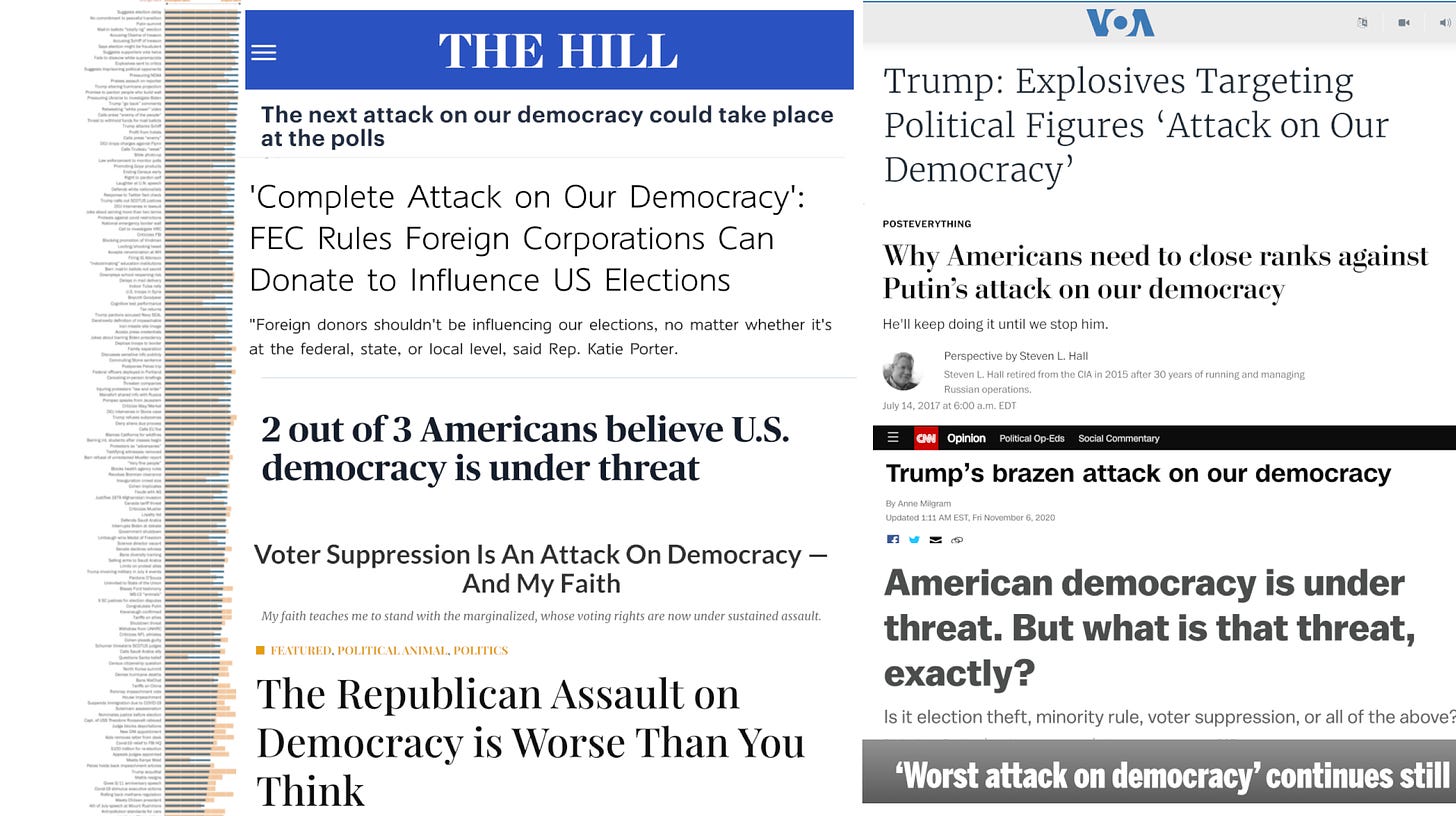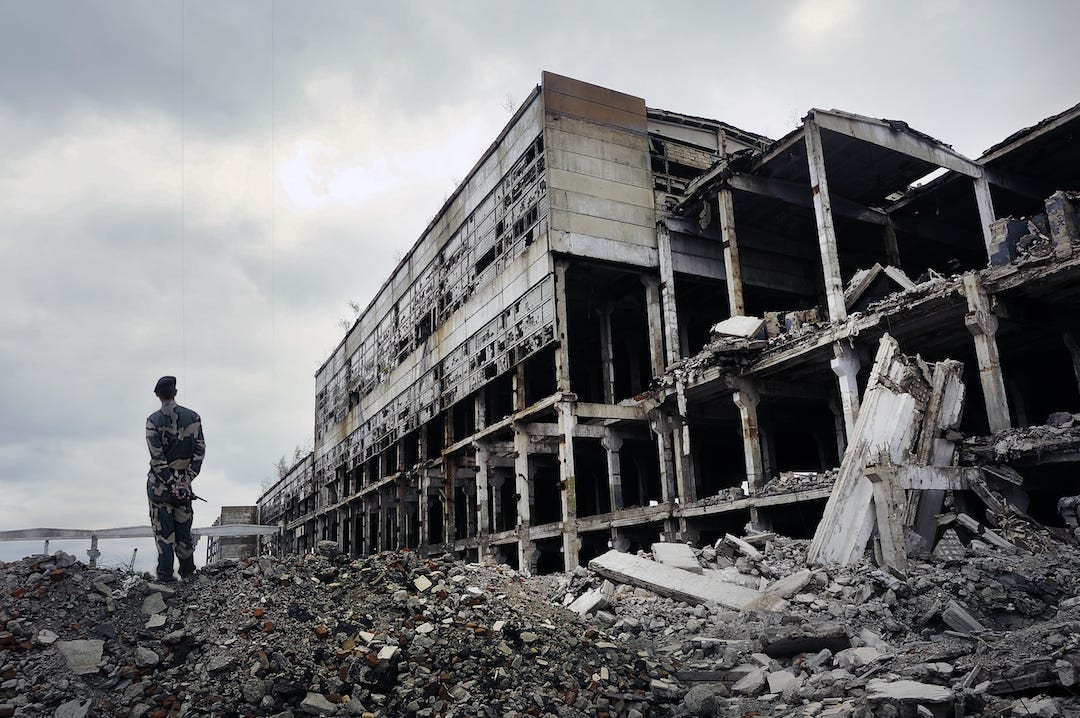

Government By Panic
by Matt Taibbi | Jan 6, 2023
“This is completely an isolated and accidental incident caused by force majeure, but the U.S. still hyped up the incident on purpose and even used force to attack.” — Chinese foreign minister Mao Ning
Empires can’t be ruled without belief. Without confidence in official words, subjects will lack direction, becoming “lost at sea,” as Revolt of the Public author Martin Gurri put it. They’ll support Brexit, Catalan independence, Trump; they’ll wear yellow vests, throw away masks, even refuse the shot. When you tell them Beto O’Rourke is Robert Kennedy, they vote as if he were Ralph Nader.
Now take a hypothetical. Say you’re a member of the American political establishment after the 2016 election of Donald Trump. You’re staring at four years as part of a government-in-exile and need a new message to solve your belief problem. What’s your answer?
My hypothesis is such people never bothered to find one. Instead, they declared a state of emergency.
What emergency? Doesn’t matter. Russian interference was a good startup disaster, but you can keep changing them. The important thing is the pattern. One, declare a crisis. Two, spread panic. Three, take emergency measures. If you do this over and over, you end up with permanent crisis, permanent panic, permanent emergency rule. So long as new crises keep evoking unconscious fear and anxiety, the legitimacy of the political establishment is continuously justified.
An episode that took place over the weekend speaks directly to our leaders’ new dependence on government-by-panic. A Chinese balloon of unknown etiology drifted into American airspace, and wigs flipped from coast to coast. The episode ended in Kubrickian spoof, with one unsmiling official after another lining up to declare victory over a balloon. And nobody thought it was odd.
The Chinese airship was declared a “spy balloon” on the Internet instantaneously. Hype and fear built all weekend until finally, in a story I initially thought was a joke, the United States military shot the thing down off the coast of South Carolina with an F-22 Raptor jet launched from Langley Air Force in Virginia.
?#BREAKING: Incredible HD footage of the Chinese surveillance balloon being shot down
?#MyrtleBeach l #SC
Watch incredible HD video of the moment when the Chinese surveillance balloon was shot down by a single missile from an F-22 fighter jet from Langley Air Force Base pic.twitter.com/KjwTrgcvcb
— R A W S A L E R T S (@rawsalerts) February 4, 2023
The comedy factor is off the charts. The F-22 is one of the most expensive weapons ever built, costing taxpayers $334 million per plane, with a program tab of more than $60 billion. The jet has the radar signature of a hummingbird, screams upward at 62,000 feet a minute, and is generally so super-awesome that we’ve banned its export, not wanting the Japanese or the Saudis or even the Australians to possess our secret Promethean fire.
The idea that this celebrated super-weapon got its first air-to-air victory shooting down a fucking balloon is as perfect a demonstration of the pitiful mindset of modern American leaders as could be conceived. That it apparently happened before we were even sure it was a spy craft, just before supposed diplomatic talks with China, and while more sophisticated Chinese satellites zoomed over us in space made this an even more damning satirical bullseye.
News stories full of frightened official commentary were legion. They dragged out a NORAD general to warn us there’s “a domain awareness gap that we have to figure out.” New York Senator Chuck Schumer gave an impromptu presser stressing that the balloon episode could end up being a good thing. “We can learn a great deal about China’s capabilities and what they are up to,” he said, referring to the chance to retrieve balloon debris. Former CIA head Leon Panetta ripped Joe Biden for not shooting the balloon down sooner, instead of letting it “traverse the entire country.” Secretary of State Tony Blinken admitted upcoming talks with China mattered, but balloon freakout took precedence.
“We continue to believe that having open lines of communication is important,” pronounced Blinken. “But the most important thing right now is to see that this surveillance asset gets out of our airspace, and we’ll take it from there.”
Translation: I have real diplomatic work to do, but the tenuous nature of my authority requires I spend the weekend humping a panic button, so my government can keep the public in a nervous stupor and ultimately declare victory over a balloon.
In America, the ritual of panic has now become more important than real-world governance. We became a world power building cars, planes, light bulbs. Now we make panics, and tending to them is the first business of state.
Try this exercise. Go to Google (I stopped using that devious propaganda site about a month ago, but it’s useful for this exercise). Enter “attack on our democracy,” “attacks on democracy,” or any similar phrase. You’ll find a deluge. Here’s a brief thumbnail list of “attacks” we’ve endured since late 2016:
- November, 2016, Trump’s “Russian interference”-aided election. Regularly characterized as a 9/11-like moment, so much so that it would soon become known as “the 2016 attack on our democracy,” or an “unprecedented attack on our democracy.”
- July, 2017, revelations of Trump Tower meeting with Russian lawyers. “Americans need to close ranks against Putin’s attack on our democracy,” declared the CIA’s onetime Moscow station chief Steven Hall, in the Washington Post.
- September 2019, Ukrainegate. “This was an attack on our democracy,” Rhode Island congressman David Cicilline said.
- November 6, 2020, Trump’s speech claiming Democrats were trying to “steal” the election. “At its core, the President’s speech was an attack on our democracy,” wrote NYU law scholar Anne Milgram in CNN, in a piece headlined, “Trump’s brazen attack on our democracy.”
- January 6th, 2021, Capitol Riots. Joe Biden called this the “worst attack on our democracy since the Civil War.”
- March 26, 2021, Georgia’s “voter suppression” bill. “The law signed in GA today is a blatant attempt to suppress the votes of Black Americans and an attack on our democracy,” said Bill Clinton.
- October, 2022, the assault on Paul Pelosi. “The attack on Paul Pelosi was an attempt to intimidate all of us. Don’t let it,” wrote the San Francisco Chronicle.
Note that in each of these cases, “attack” language spread far and wide, rarely confining itself to a few commentators. Matt Orfalea made a video about how quickly the “worst attack on our democracy since the Civil War” language spread:
The “attacks on our democracy” list has grown too big for the press to manage. It’s become humorously common for news organizations to lump them in bunches, a la a Vox article last year about “Four Threats to Democracy,” or PBS learning via poll that 2 out of 3 Americans think democracy is under an unspecified threat, or an incredible Washington Post article from 2020 called “Trump’s most worrying attacks on democracy, in one giant chart.” You needed a magnifying glass the size of Columbus Circle to read that thing, and that was in just one article! There were so many more:

The Post by the end of the Trump years was collecting “attacks on our democracy” the way the New York Times used to collect “ties” to Russia. Its chief media writer Margaret Sullivan even wrote a piece insisting that reporters needed to stay close to the hyperbolic “attack” framing, resist the urge to look at “both sides,” and “stop being savvy, and start being patriotic.” New Journalism 101: stay panicked, and if anything moves in your direction (like a balloon), stab it with a flagpole:

This subject is on my mind among other things because an emerging subtext of the #TwitterFiles reporting that’s been keeping me away from the site recently (I’ve been on the road, as I’ll explain soon) has to do with a widening network of shadowy new institutions built to feed the national panic machine.
After Trump’s election the old think-tanks and academic organizations we relied upon to give credibility to official pronouncements had a makeover. Suddenly a parade of new, official-sounding outlets began appearing and entering the lexicon. They served both as news sources and as homes for researchers who would “help” private platforms and journalists assess “inauthentic” or “fake” or “dangerous” content, or foreign threats. Hamilton 68, which we now know helped spawn countless news stories misidentifying organic Internet conversation as Russian influence activities, was just one of dozens.
From the “Center for Countering Digital Hate” to the Atlantic Council’s “Digital Forensic Research Lab” or Harvard’s “Technology and Social Change Project” (shut down last Friday in a mysterious development) or dozens of others, the landscape is now littered with extravagantly funded institutions, many supported not just by the government but by money from defense or intelligence agencies. These outlets exist to feed public panics and reinforce narratives about the system being under immediate “existential” threat. Nearly every one of them will have a reference to “democracy under attack” somewhere on their face or about pages.
These institutions were designed to address an emergency, all right, but never the one they claim to be concerned about. The real crisis is the loss of public faith in government. To keep the public’s heresy in check, these groups are pumping the Internet full of tales from the bottomless well of panic narratives they craft, many about foreign subversion or domestic extremism. The idea is to get the public in a place where it will spend days terrified of a foreign balloon flying overhead, or obsessing about the nature of the balloon’s mission, or raging at the government’s impotence against the balloon, or whatever. Anything is fine, so long as people aren’t calm, happy, and free to assess world events with a sober, independent mind.
We don’t ask, “Are we sure it’s not just a weather balloon drifted off course? Because we’d look stupid sending an F-22 to blow it out of the sky in that case.” It’s unlikely the press will follow up much on the question, either. The panic is now the point, and once that passes, so does our interest, no matter what the truth of what just happened.





0 Comments